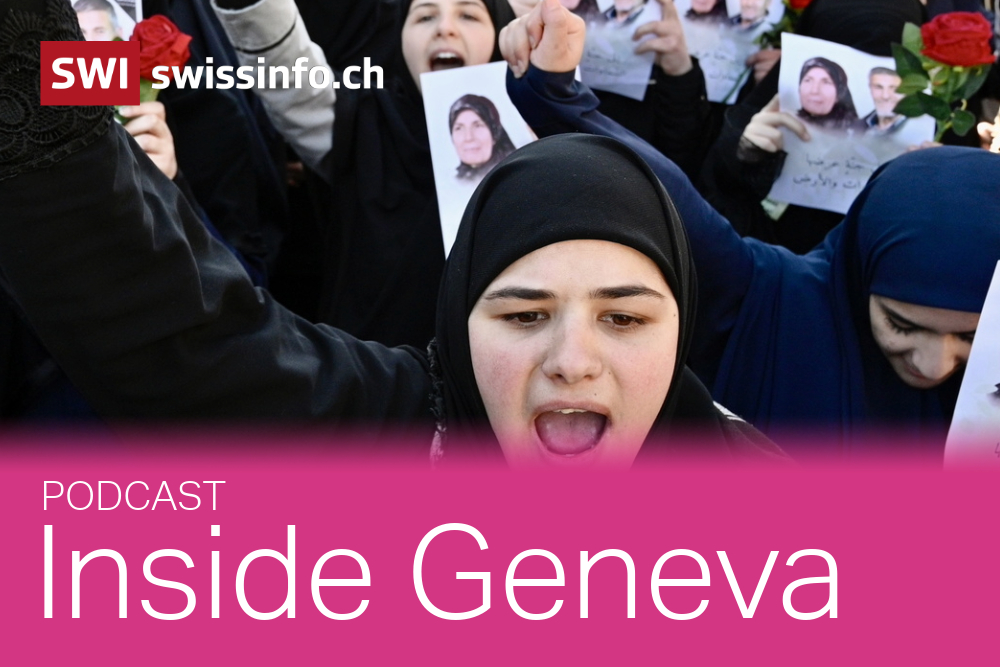Inside Geneva – women defending women
This week on Inside Geneva we’re kicking off a summer series of profiles; in-depth, one-on-one interviews with people who live and work in Geneva, but whose influence stretches right round the world.
We’ll be talking to doctors who work in war zones, to medical researchers looking for treatments and cures for the illnesses which affect the world’s poorest, and therefore tend to be neglected when it comes to research funding. We’ll hear from people extending a welcoming hand to refugees in Geneva, and many more – we haven’t even completed our list yet, so if you’ve got someone you think we should be talking to, let us know.
We start with a woman who helps other women, worldwide, to defend themselves from exploitation and violence. Antonia Mulvey, an international human rights lawyer, runs Legal Action Worldwide (LAW), a Geneva based not-for-profit organisation that provides legal assistance, very often in conflict zones, to women.

More
Summer profiles: women defending other women around the world
The first question she asks women, she tells Inside Geneva, is “what kind of justice do they want?” In conflicts, or in relation to the most serious human rights violations, we tend to think immediately of international legal institutions – the International Criminal Court, or the International Court of Justice.
But in many cases the courts – regional or national – in the country in which the abuse has taken place can be the right avenue. Mulvey is, for example, defending a woman, trafficked from Africa to Lebanon, in a domestic slavery case in Lebanon’s own courts. “It could be a ground-breaking case for hundreds of thousands of women,” says Mulvey.
Is court the only answer?
But as any woman who has ever tried to report domestic or sexual violence knows, getting supportive access to justice can be difficult, and the whole experience of trying to get justice at all can be traumatic, even in the most developed, apparently gender-equal, democracies.
This is why Mulvey, when she talks to affected women, does not necessarily put on the proverbial wig and gown and go full legal from the start. “With many of those that we work with who have been subjected to sexual violence” she explains, “part of it is listening to them, hearing them, acknowledging what has happened.”
+Listen to our podcast episode about the conflict in Sudan
Her work with survivors of sexual violence in Sudan, for example, also focusses on supporting women within a community to challenge the idea that such violence can ever be acceptable.
“Many of them don’t want to go to court, but they can take steps to prevent it by talking to others, to help stop it, and to raise the issue.”
The affected women, she insists “have to lead the way… Some have the courage and bravery to step forward, and we represent them in legal cases.”
Mulvey admits that, as a lawyer, she would always like to go “straight to court,” but, she points out, not every individual or community wants that. In some cases she deals with, involving violence that may have occurred decades ago, an acknowledgement and a formal apology from the authorities can go a long way towards justice and healing, which, she says, “are intertwined.”
Women making their voices heard
What becomes apparent, talking to Mulvey, is women’s strength and determination, even in the most challenging circumstances or oppressive regimes.
An example we perhaps all know are the Mothers of the Plaza de Mayo: Argentinian women who campaigned for decades against their country’s brutal military regime, demanding to know the whereabouts of thousands of “disappeared”, many of them their own sons and daughters. Their peaceful resistance led, eventually, to the UN Convention on Enforced Disappearances.
Today, Mulvey points to the work of Rohingya women. Despite coming from a patriarchal society in Myanmar, where their voices were seldom heard, when, in 2017, the Rohingya community were violently driven out of Myanmar, it was women who are led the fight for justice. “It is them who have made the first filing before the International Criminal Court,” explains Mulvey. “They have made hundreds of witness statements for the International Court of Justice.”

More
Inside Geneva: aid without women in Afghanistan
Mulvey’s Legal Action Worldwide has a network of over 2,000 people around the world, because “we can’t just sit here in Switzerland…we need to be in the communities, where the violations have taken place.”
But, the wheels of international justice do, Mulvey acknowledges, grind very slowly. Bosnia’s women of Srebrenica, whose husbands, sons, brothers and fathers were rounded up and executed by Serbian forces in 1995, had to wait decades for the man who commanded those forces, Ratko Mladic, to be tried and convicted for genocide and crimes against humanity. Nevertheless, Mulvey remains determined – and inspired by the women she works with.
“Let’s step up, let’s work with women, let’s work with women’s groups, to take more cases, to keep challenging, to keep pushing that door open.”
Edited by Virginie Mangin

In compliance with the JTI standards
More: SWI swissinfo.ch certified by the Journalism Trust Initiative











You can find an overview of ongoing debates with our journalists here . Please join us!
If you want to start a conversation about a topic raised in this article or want to report factual errors, email us at english@swissinfo.ch.